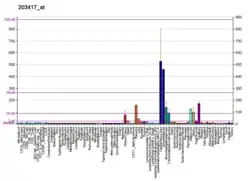MFAP2
Microfibrillar-associated protein 2 is a protein that in humans is encoded by the MFAP2 gene.[5][6]
| MFAP2 | |||||||||||||||||||||||||
|---|---|---|---|---|---|---|---|---|---|---|---|---|---|---|---|---|---|---|---|---|---|---|---|---|---|
| Identifiers | |||||||||||||||||||||||||
| Aliases | MFAP2, MAGP, MAGP-1, MAGP1, microfibrillar associated protein 2, microfibril associated protein 2 | ||||||||||||||||||||||||
| External IDs | OMIM: 156790 MGI: 99559 HomoloGene: 1801 GeneCards: MFAP2 | ||||||||||||||||||||||||
| |||||||||||||||||||||||||
| |||||||||||||||||||||||||
| |||||||||||||||||||||||||
| |||||||||||||||||||||||||
| Orthologs | |||||||||||||||||||||||||
| Species | Human | Mouse | |||||||||||||||||||||||
| Entrez | |||||||||||||||||||||||||
| Ensembl | |||||||||||||||||||||||||
| UniProt | |||||||||||||||||||||||||
| RefSeq (mRNA) | |||||||||||||||||||||||||
| RefSeq (protein) | |||||||||||||||||||||||||
| Location (UCSC) | Chr 1: 16.97 – 16.98 Mb | Chr 4: 141.01 – 141.02 Mb | |||||||||||||||||||||||
| PubMed search | [3] | [4] | |||||||||||||||||||||||
| Wikidata | |||||||||||||||||||||||||
| |||||||||||||||||||||||||
Microfibrillar-associated protein 2 is a major antigen of elastin-associated microfibrils and a candidate for involvement in the etiology of inherited connective tissue diseases. This gene encodes two transcripts with two alternatively spliced 5' untranslated exons. These two transcripts contain the same eight coding exons, and therefore, encode the same protein.[6]
References
- GRCh38: Ensembl release 89: ENSG00000117122 - Ensembl, May 2017
- GRCm38: Ensembl release 89: ENSMUSG00000060572 - Ensembl, May 2017
- "Human PubMed Reference:". National Center for Biotechnology Information, U.S. National Library of Medicine.
- "Mouse PubMed Reference:". National Center for Biotechnology Information, U.S. National Library of Medicine.
- Faraco J, Bashir M, Rosenbloom J, Francke U (Jun 1995). "Characterization of the human gene for microfibril-associated glycoprotein (MFAP2), assignment to chromosome 1p36.1-p35, and linkage to D1S170". Genomics. 25 (3): 630–7. doi:10.1016/0888-7543(95)80004-6. PMID 7759096.
- "Entrez Gene: MFAP2 microfibrillar-associated protein 2".
Further reading
- Gibson MA, Hughes JL, Fanning JC, Cleary EG (1986). "The major antigen of elastin-associated microfibrils is a 31-kDa glycoprotein". J. Biol. Chem. 261 (24): 11429–36. doi:10.1016/S0021-9258(18)67403-4. PMID 3015971.
- Maruyama K, Sugano S (1994). "Oligo-capping: a simple method to replace the cap structure of eukaryotic mRNAs with oligoribonucleotides". Gene. 138 (1–2): 171–4. doi:10.1016/0378-1119(94)90802-8. PMID 8125298.
- Brown-Augsburger P, Broekelmann T, Rosenbloom J, Mecham RP (1996). "Functional domains on elastin and microfibril-associated glycoprotein involved in elastic fibre assembly". Biochem. J. 318 (1): 149–55. doi:10.1042/bj3180149. PMC 1217601. PMID 8761465.
- Finnis ML, Gibson MA (1997). "Microfibril-associated glycoprotein-1 (MAGP-1) binds to the pepsin-resistant domain of the alpha3(VI) chain of type VI collagen". J. Biol. Chem. 272 (36): 22817–23. doi:10.1074/jbc.272.36.22817. PMID 9278443.
- Suzuki Y, Yoshitomo-Nakagawa K, Maruyama K, et al. (1997). "Construction and characterization of a full length-enriched and a 5'-end-enriched cDNA library". Gene. 200 (1–2): 149–56. doi:10.1016/S0378-1119(97)00411-3. PMID 9373149.
- Fujimoto N, Tajima S, Ishibashi A (2000). "Expression of microfibril-associated glycoprotein-1 (MAGP-1) in human epidermal keratinocytes". Arch. Dermatol. Res. 292 (1): 21–6. doi:10.1007/PL00007456. PMID 10664011. S2CID 36505268.
- Trask BC, Broekelmann T, Ritty TM, et al. (2001). "Posttranslational modifications of microfibril associated glycoprotein-1 (MAGP-1)". Biochemistry. 40 (14): 4372–80. CiteSeerX 10.1.1.721.7743. doi:10.1021/bi002738z. PMID 11284693.
- Jensen SA, Reinhardt DP, Gibson MA, Weiss AS (2001). "Protein interaction studies of MAGP-1 with tropoelastin and fibrillin-1". J. Biol. Chem. 276 (43): 39661–6. doi:10.1074/jbc.M104533200. PMID 11481325.
- Reinboth B, Hanssen E, Cleary EG, Gibson MA (2002). "Molecular interactions of biglycan and decorin with elastic fiber components: biglycan forms a ternary complex with tropoelastin and microfibril-associated glycoprotein 1". J. Biol. Chem. 277 (6): 3950–7. doi:10.1074/jbc.M109540200. PMID 11723132.
- Segade F, Trask BC, Broekelmann TJ, et al. (2002). "Identification of a matrix-binding domain in MAGP1 and MAGP2 and intracellular localization of alternative splice forms". J. Biol. Chem. 277 (13): 11050–7. doi:10.1074/jbc.M110347200. PMID 11796718.
- Strausberg RL, Feingold EA, Grouse LH, et al. (2003). "Generation and initial analysis of more than 15,000 full-length human and mouse cDNA sequences". Proc. Natl. Acad. Sci. U.S.A. 99 (26): 16899–903. doi:10.1073/pnas.242603899. PMC 139241. PMID 12477932.
- Werneck CC, Trask BC, Broekelmann TJ, et al. (2004). "Identification of a major microfibril-associated glycoprotein-1-binding domain in fibrillin-2". J. Biol. Chem. 279 (22): 23045–51. doi:10.1074/jbc.M402656200. PMID 15044481.
- Clarke AW, Weiss AS (2004). "Microfibril-associated glycoprotein-1 binding to tropoelastin: multiple binding sites and the role of divalent cations". Eur. J. Biochem. 271 (14): 3085–90. doi:10.1111/j.1432-1033.2004.04246.x. PMID 15233806.
- Gerhard DS, Wagner L, Feingold EA, et al. (2004). "The status, quality, and expansion of the NIH full-length cDNA project: the Mammalian Gene Collection (MGC)". Genome Res. 14 (10B): 2121–7. doi:10.1101/gr.2596504. PMC 528928. PMID 15489334.
- Rual JF, Venkatesan K, Hao T, et al. (2005). "Towards a proteome-scale map of the human protein-protein interaction network". Nature. 437 (7062): 1173–8. Bibcode:2005Natur.437.1173R. doi:10.1038/nature04209. PMID 16189514. S2CID 4427026.
- Miyamoto A, Lau R, Hein PW, et al. (2006). "Microfibrillar proteins MAGP-1 and MAGP-2 induce Notch1 extracellular domain dissociation and receptor activation". J. Biol. Chem. 281 (15): 10089–97. doi:10.1074/jbc.M600298200. PMID 16492672.
- Gregory SG, Barlow KF, McLay KE, et al. (2006). "The DNA sequence and biological annotation of human chromosome 1". Nature. 441 (7091): 315–21. Bibcode:2006Natur.441..315G. doi:10.1038/nature04727. PMID 16710414.
This article is issued from Wikipedia. The text is licensed under Creative Commons - Attribution - Sharealike. Additional terms may apply for the media files.




